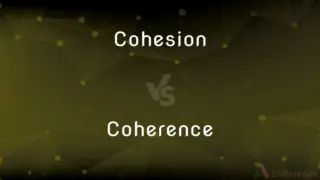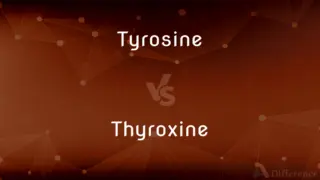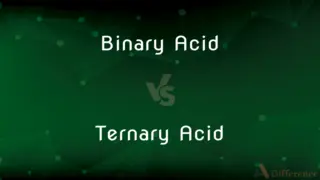Gangster vs. Thug — What's the Difference?
By Urooj Arif & Maham Liaqat — Updated on March 30, 2024
A gangster is a member of an organized crime syndicate involved in illegal activities, while a thug traditionally refers to a violent criminal or a brute, often acting independently.

Difference Between Gangster and Thug
Table of Contents
ADVERTISEMENT
Key Differences
Gangsters are individuals who are part of organized crime groups or syndicates. These groups are involved in various illegal activities, including but not limited to extortion, drug trafficking, and money laundering. The term 'gangster' often conveys an image of someone involved in sophisticated criminal endeavors, with a structured hierarchy within the organization. On the other hand, a thug is generally used to describe someone who engages in violence or criminality, often acting alone or with less organized groups. The term originally comes from the Thuggee cult in India, but in contemporary usage, it lacks the association with any specific organization, focusing more on the violent behavior or brute force employed by the individual.
Gangsters are often romanticized or vilified in popular culture, depicted as suave criminals with a code of honor, though reality can be much harsher and less glamorous. They operate within the framework of their criminal organization, adhering to its rules and hierarchy. Thugs, in contrast, are depicted as more indiscriminate in their violence, lacking the organizational loyalty or structure associated with gangsters. Their actions are often driven by personal gain or malice rather than a coordinated criminal effort.
In terms of activities, gangsters are involved in a wide range of criminal enterprises, often requiring coordination and cooperation within their syndicate. This could involve complex operations like running illegal gambling rings, engaging in human trafficking, or managing underground markets. Thugs, while they may engage in similar criminal activities, are more often associated with direct acts of violence such as assault, robbery, or intimidation on a more individual or impulsive basis.
The public perception and legal approach to dealing with gangsters and thugs also differ. Gangsters, due to their involvement in organized crime, are often targeted by specific law enforcement units dedicated to dismantling criminal organizations. Thugs, being more individualistic in their criminal behavior, are dealt with through regular law enforcement efforts aimed at curbing violent crime and protecting public safety.
Both gangsters and thugs pose significant challenges to society and law enforcement. However, the approach to combating the criminal activities associated with each is different, reflecting the organized versus individual nature of their crimes. While gangsters might be part of a larger societal issue related to organized crime, thugs are often seen as a more immediate threat to personal safety due to their violent actions.
ADVERTISEMENT
Comparison Chart
Definition
A member of an organized crime group.
A violent criminal or brute, often acting independently.
Origin
Part of a structured crime syndicate.
Traditionally linked to the Thuggee cult in India, now refers to individual criminals.
Activities
Engaged in a variety of illegal activities including extortion, trafficking, and laundering.
Typically involved in acts of violence, robbery, or intimidation.
Organization
Operates within a hierarchical criminal organization.
Acts independently or with less organization.
Cultural Depiction
Often romanticized or portrayed with a code of honor in media.
Depicted as indiscriminate in violence and motivated by personal gain or malice.
Compare with Definitions
Gangster
A member of an organized crime syndicate.
The movie depicted the life of a gangster rising through the ranks of the mafia.
Thug
Often acts independently.
Thugs robbed the store without any apparent connection to organized crime.
Gangster
Involved in sophisticated criminal operations.
Gangsters ran the prohibition-era bootlegging business.
Thug
Associated with direct acts of violence.
The victim was assaulted by a street thug.
Gangster
Subject to targeted law enforcement.
The gangster was caught in a sting operation by the anti-mafia squad.
Thug
Dealt with by regular law enforcement.
Local police are increasing patrols to deter thugs.
Gangster
Often romanticized in media.
Popular films have glamorized the gangster lifestyle.
Thug
Lacks a romanticized image in media.
News reports often portray thugs as a menace to society.
Gangster
Operates within a hierarchy.
He was just a low-level gangster in the criminal organization.
Thug
A violent criminal or brute.
The thug was known for his ruthless tactics.
Gangster
A gangster is a criminal who is a member of a gang. Most gangs are considered to be part of organized crime.
Thug
A cutthroat or ruffian; a hoodlum.
Gangster
A member of an organized group of criminals; a racketeer.
Thug
Also Thug One of a group of professional criminals, devotees of Kali, who robbed and murdered travelers in northern India until the mid-1800s.
Gangster
A member of a gang of delinquents.
Thug
Someone with an intimidating and unseemly appearance and mannerisms, who treats others violently and roughly, often for hire.
Gangster
A member of a criminal or street gang.
Thug
(historical) One of a band of assassins formerly active in northern India who worshipped Kali and offered their victims to her.
Gangster
A member of a professional criminal organization; a racketeer.
Thug
(horticulture) An over-vigorous plant that spreads and dominates the flowerbed.
Gangster
To act like a gangster; to commit street crime or run a racket.
Thug
A punk; a hoodlum; a hooligan.
Gangster
A criminal who is a member of gang
Thug
A wooden bat used in the game of miniten, fitting around the player's hand.
Thug
(AAVE) One who, usually as a result of social disadvantage, has turned to committing crimes (e.g. selling drugs, robbery, assault, etc.) to make a living; a gangsta.
Thug
To commit acts of thuggery, to live the life of a thug, or to dress and act in a manner reminiscent of someone who does.
Thug
One of an association of robbers and murderers in India who practiced murder by stealthy approaches, and from religious motives. They have been nearly exterminated by the British government.
Thug
An assassin; a ruffian; a rough.
Thug
An aggressive and violent young criminal
Common Curiosities
Are all gangsters involved in violent crimes?
While many gangsters may be involved in violent crimes as part of their organization's activities, not all gangsters directly engage in violence; some may specialize in non-violent illegal activities like fraud or money laundering.
How do law enforcement agencies differentiate between gangsters and thugs?
Law enforcement differentiates based on the nature of the crimes and the organizational involvement of the individuals. Gangsters are often targeted by specialized units focusing on organized crime, while efforts to combat thugs are typically part of broader violent crime prevention strategies.
Is the term 'thug' always associated with criminal behavior?
In contemporary usage, 'thug' predominantly refers to individuals engaged in violent or criminal behavior, though the term can sometimes be used more broadly to describe someone with a rough or aggressive demeanor.
Has the portrayal of gangsters and thugs in media affected public perception?
Yes, media portrayals have significantly influenced public perceptions, often glamorizing gangsters as charismatic anti-heroes and depicting thugs as faceless agents of chaos, which can affect societal attitudes towards crime and law enforcement.
Can a thug become a gangster?
A thug could potentially join an organized crime group and become a gangster if they align with the group's activities and structure.
What motivates someone to become a thug?
Motivations can vary widely, including economic hardship, social or environmental influences, a desire for power or respect, or a lack of lawful opportunities.
How do communities combat the influence of gangsters?
Communities combat gangster influence through a combination of law enforcement action, social programs aimed at youth education and employment, community policing efforts, and initiatives to strengthen community resilience and cohesion.
Do gangsters operate internationally?
Yes, many organized crime groups have international operations, engaging in activities like drug trafficking, money laundering, and human trafficking across borders.
What impact do gangsters and thugs have on local businesses?
They can have a significant negative impact, including extortion demands, theft, and fostering an environment of fear and instability that can drive customers away and increase business costs.
How do gangsters recruit new members?
Recruitment methods can include targeting vulnerable individuals, offering protection or financial incentives, familial connections, or through the allure of the lifestyle portrayed by the organization.
Are there any rehabilitation programs for gangsters or thugs?
There are rehabilitation programs aimed at helping individuals leave the criminal lifestyle behind, including job training, education, and counseling services, often focused on addressing the root causes of their criminal behavior.
How does the presence of gangsters and thugs affect property values?
The presence of organized crime and violence can decrease property values due to perceived safety risks and the detrimental impact on the quality of life in affected areas.
What legal measures are in place to combat organized crime?
Legal measures include anti-racketeering laws, targeted sanctions against organized crime members, enhanced sentencing for gang-related activities, and international cooperation to dismantle criminal networks.
How do gangsters launder money?
Money laundering methods include using legitimate businesses to disguise illegal revenues, offshore banking in countries with lax regulations, and investing in high-value assets to obscure the origin of funds.
Can a person be wrongfully labeled as a thug?
Yes, individuals can be wrongfully labeled as thugs based on biases, stereotypes, or misunderstandings, which can lead to unjust treatment or discrimination.
Are there specific signs that indicate thug activity in a neighborhood?
Signs may include increased violence or vandalism, graffiti marking territory, a visible presence of individuals engaging in suspicious activities, and a general decline in the sense of community safety.
Share Your Discovery

Previous Comparison
Footpath vs. Sidewalk
Next Comparison
Authority vs. AutonomyAuthor Spotlight
Written by
Urooj ArifUrooj is a skilled content writer at Ask Difference, known for her exceptional ability to simplify complex topics into engaging and informative content. With a passion for research and a flair for clear, concise writing, she consistently delivers articles that resonate with our diverse audience.
Co-written by
Maham Liaqat















































